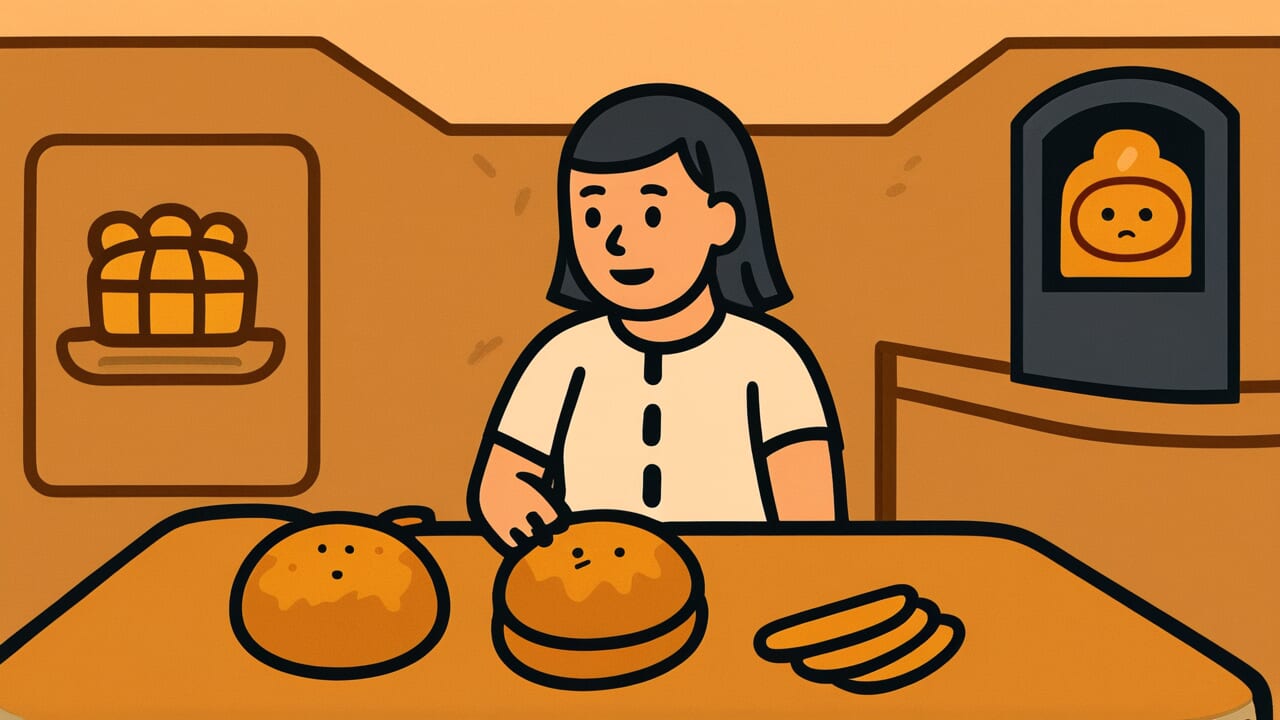How to Read “Man does not live by bread alone”
Hito wa pan nomi nite ikuru mono ni arazu
Meaning of “Man does not live by bread alone”
This proverb means that humans cannot truly live on food and material satisfaction alone. No matter how abundant the meals or comfortable the living conditions, these things by themselves cannot fulfill the human heart.
People need invisible values like spiritual fulfillment, love, purpose, beliefs, the joy of beauty, and connections with others.
People use this proverb when they feel tired of pursuing material wealth. It also applies when someone feels empty inside despite being financially comfortable.
The saying warns against a lifestyle focused only on money and possessions. In modern society, consumer culture tends to emphasize material wealth.
This proverb reminds us that essential human needs exist beyond material things.
Origin and Etymology
This proverb is widely known to come from words recorded in the Gospel of Matthew in the New Testament. After Jesus Christ fasted for 40 days in the wilderness, the devil tempted him saying, “Turn these stones into bread.”
Jesus responded, “Man does not live by bread alone, but by every word that comes from the mouth of God.”
The words themselves can be traced back even further to the Book of Deuteronomy in the Old Testament. Moses spoke these words to the people of Israel.
He reflected on their 40 years of trials in the wilderness and explained the meaning of manna, the food from heaven that God provided.
In Japan, this phrase spread from the Meiji period onward through Bible translations. It gradually became established as a common proverb, separate from its Christian context.
People accepted it across religious boundaries as a phrase expressing the universal truth that material wealth alone cannot satisfy humans. The characteristic feature of this proverb is how it symbolically represents all visible material things through the concrete image of “bread.”
Usage Examples
- My salary went up, but man does not live by bread alone—I can’t continue a job without meaning
- He became successful and can buy anything, but as they say, man does not live by bread alone—he doesn’t seem to have found satisfaction in his heart
Universal Wisdom
This proverb has been passed down through thousands of years because it sharply captures the essence of human nature. Looking back at human history, obtaining food for survival was the top priority for a long time.
But strangely, humans were never satisfied even when minimum survival was guaranteed.
They painted on cave walls, sang songs, told stories, and offered prayers to gods. These activities had no direct connection to survival.
Yet humans have always devoted time and energy to these activities since ancient times. Why? Because humans are not merely biological beings, but beings who seek meaning.
We cannot escape the question “Why do we live?” The human heart cannot endure a cycle of just eating, sleeping, and eating again.
We want to be loved, recognized, to accomplish something, to touch beautiful things, to help someone. These desires cannot be satisfied by bread.
This proverb expresses in simple words that humans are beings who live on a dimension beyond material things. It speaks to human dignity itself.
When AI Hears This
The human brain has multiple neural circuits called reward systems, each operating with different chemical substances. Material rewards like food and money trigger the release of a neurotransmitter called dopamine.
This dopamine creates the desire for “more,” but actually doesn’t produce much satisfaction itself. In other words, even if you keep eating bread, your brain just seeks “the next bread” and has difficulty reaching deep fulfillment.
On the other hand, human relationships, social contribution, and creative activities activate different neurotransmitters like serotonin and oxytocin. These are circuits that produce the feeling of “being satisfied.”
What’s interesting is that when only the dopamine system is continuously stimulated, the brain gradually becomes less responsive. The same reward no longer satisfies. Neuroscience calls this desensitization of the reward system.
Even more noteworthy is the phenomenon where satisfying higher-level needs in Maslow’s hierarchy, like esteem and self-actualization, naturally weakens attachment to lower physiological needs.
This happens because multiple reward systems in the brain balance each other. A life pursuing only bread disrupts the balance of neural circuits and actually creates a state of chronic dissatisfaction.
This proverb saw through the fact that the human brain is designed with a multi-layered reward system, even before the age of science.
Lessons for Today
This proverb teaches us the importance of developing the ability to discern what true richness really is. In our daily lives, we feel anxious seeing others’ glamorous lives on social media.
We become desperate to acquire more expensive things. Stop and think about it. What are you really seeking?
You don’t need to deny material wealth. A comfortable life is important. But it’s equally important, or perhaps more important, to pay attention to things that fulfill your heart.
Time listening to your favorite music, time spent with loved ones, moments when you feel your own growth, opportunities to encounter someone’s smile. These invisible values are what truly enrich your life.
Starting today, why not value experiences that move your heart a little more than buying things? It might be a walk, or a conversation with a friend.
Small things are fine. Consciously increase the moments when your heart feels “alive.” That is the path to a truly rich life that this proverb shows us.



Comments